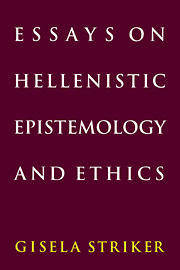Book contents
- Frontmatter
- Contents
- Preface
- Acknowledgments and essay sources
- List of abbreviations: Frequently cited names and titles
- EPISTEMOLOGY
- 1 Methods of sophistry
- 2 Kριτήριον τῆς ἀληθείας
- 3 Epicurus on the truth of sense impressions
- 4 Sceptical strategies
- 5 The Ten Tropes of Aenesidemus
- 6 On the difference between the Pyrrhonists and the Academics
- 7 The problem of the criterion
- ETHICS
- Name index
- Index of passages cited
6 - On the difference between the Pyrrhonists and the Academics
Published online by Cambridge University Press: 05 June 2012
- Frontmatter
- Contents
- Preface
- Acknowledgments and essay sources
- List of abbreviations: Frequently cited names and titles
- EPISTEMOLOGY
- 1 Methods of sophistry
- 2 Kριτήριον τῆς ἀληθείας
- 3 Epicurus on the truth of sense impressions
- 4 Sceptical strategies
- 5 The Ten Tropes of Aenesidemus
- 6 On the difference between the Pyrrhonists and the Academics
- 7 The problem of the criterion
- ETHICS
- Name index
- Index of passages cited
Summary
Skepticism seems of late to have had a kind of renaissance among philosophers. Apart from the usual chapters on skeptical doubt in general treatments of epistemology, there is now a whole series of books and articles, in which a position described as ‘skeptical’ is analyzed and either defended or attacked. Hence it is understandable that historians of philosophy too have turned with renewed enthusiasm to the interpretation of the ancient reports of the Greek skeptics. It seems to me that our picture of ancient skepticism has become more subde and precise through the scholarly studies of the past twelve years (since the appearance in 1969 of Charlotte Stough's book Greek Skepticism), so that it may be worthwhile to take up again the “old question, treated by many Greek authors” (Gellius XI v 6) of the difference between the two skeptical movements in antiquity. For anyone concerned to understand the grounds for skeptical doubt of the possibility of knowledge, it will certainly be of interest to ask whether there were different kinds of skepticism and how these might have looked.
The title of this article belongs to a treatise by Plutarch, which has unfortunately been lost. No doubt it dealt with the difference between the two skeptical schools, because though of course any philosopher from Plato's school could be called an Academic, still, in late antiquity, this label usually referred to the members of the New Academy, of whom the most famous were Arcesilaus in the third century B.C., and Carneades in the second.
- Type
- Chapter
- Information
- Essays on Hellenistic Epistemology and Ethics , pp. 135 - 149Publisher: Cambridge University PressPrint publication year: 1996
- 8
- Cited by



